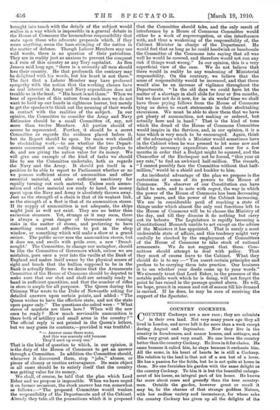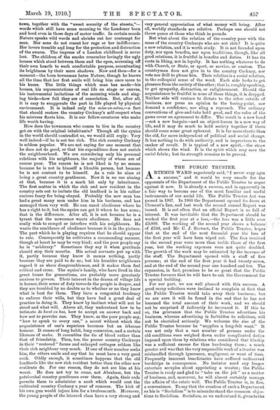COUNTRY COCKNEYS.
COUNTRY Cockneys are a new race ; they are colonists in their own land. Not very many years ago they all lived in London, and never left it for more than a week except during August and September. Now they live in the country in farmhouses, and manor houses, and cottages, and villas very great and very. small. No one loves the country better than the country Cockney. He lives in it for choice. He came because it called him, he stays because it enchants him. All the same, in his heart of hearts he is still a Cockney. His relation to the land is that not of a son but of a lover. He has a passion for the fields, but he is not quite at home in them. No one furnishes his garden with the same delight as the country Cockney. To him it is but the beautiful enlarge- ment of his house, an integral part of his home. He knows far more about roses and greenfly than the true country- man. Outside the garden, however great or small it may be, lie the charms of that strange goddess Nature, with her endless variety and inconstancy, for whose sake the country Cockney has given up all the delights of the town, together with the "sweet security of the streets,"— words which still have some meaning to the Londoner born and bred even in these days of motor traffic. In certain moods Nature speaks wild words and shrieks out her contempt for man. Her sons do not resent her rage or her indifference. Her lovers tremble and long for the protection and distraction of the swarm. The impress of a London childhood is never lost. The children of the smoke remember lovingly the ugly houses which stood between them and the open, screening off their own hearth to such comfortable purpose, accentuating its brightness by their mere shadows. Now and then—for a moment—the born townsman hates Nature, though he knows all the time that her first smile will bring him once more to his knees. The little things which man has made—his houses, his representations of real life on stage or canvas, his instrumental imitations of the moaning winds and sing- ing birds—how full they are of consolation. But, after all, it is easy to exaggerate the part in life played by physical environment. It is indeed only the fuise-en-scene,—a fact that should restore the country Cockney's self-respect when his mistress flouts him. It is our fellow-creatures who make life worth having.
How does the townsman who comes to live in the country get on with the original inhabitants? Though all the cynics in the world should contradict us, we would still reply: Very well indeed—if he is not too rich. The rich country Cockney is seldom popular. We are not saying for one moment that he does not do good, or that his expenditure does not enrich the neighbourhood. We are considering only his personal relations with his neighbours, the majority of whom are of course poor. The reason he is not liked is by no means because he is not in himself a likeable person, but because he is not content to be himself. As a rule he aims at being a great country gentleman. Now it is no use aiming at that, because it is a mark hit only by inheritance. The first matter in which the rich and new resident in the country sets out to imitate the old landlord is in his rather curious fancy for being obeyed. Probably the new man has had a great many men under him in his business, and has managed them very well He can exact obedience where he has a right to it, but the squire can get it where he has none; that is the difference. After all, it is not because he is a tyrant that the newcomer wants obedience. He does not really wish to compel or interfere with his neighbours. He wants the semblance of obedience because it is in the picture. The part which he is playing requires that he should appear to rule. Consequently he cultivates a commanding manner, though at heart he may be very kind; and the poor people say he is "arbitrary." Sometimes they say it when gratitude should stop their mouths. His actual servants put up with it, partly because they know it means nothing, partly because they are paid to do so ; but his humbler neighbours regard it as sheer disagreeableness, and it makes them feel critical and cross. The squire's family, who have lived in the great house for generations, are probably more genuinely anxious to govern. Their interest in the drama of village life is keener, their sense of duty towards the people is deeper, and they are troubled by no doubts as to whether or no they know what is best for them. They have a congenital tendency to enforce their wills, but they have had a great deal of practice in doing it. They know by instinct what will not be stood and what will. Above all, they understand how to be intimate de haut en bas, how to accept an answer back and how not to provoke one. They know, as the poor people say, "how to speak to every one," a secret without which the acquaintance of one's superiors becomes but an irksome honour. It comes of long habit, long connexion, and a certain likeness of make. It resembles the tie of blood rather than that of friendship. Then, too, the poorer country Cockneys in their "restored" farms and enlarged cottages seldom like their rich neighbour very much. If one of their number seeks him, the others smile and say that he must have a very good cook. Oddly enough, it sometimes happens that the old landlords like the new rich resident better than the other new residents do. For one reason, they do not see him at his worst. He does not try to come, not Abraham, but the patriarchal country gentleman over them. Again, their code permits them to administer a snub which would cost the cultivated country Cockney a year of remorse. The kick of his own gun would injure him for a twelvemonth. Moreover, the young people of the leisured class have a very strong and
very general appreciation of what money will bring. After all, worldly standards are relative. Perhaps one should not throw pence at those who think in pounds.
But what about the relation of the country poor with the mass of the country Cockneys who are not rich ? It is quite a new relation, and it is worth study. It is not founded upon duty, nor upon benefits, nor upon traditions, though, like all good relations, it is fruitful in benefits and duties. It has its roots in liking, not in loyalty. It has nothing whatever to do with Church, or State, or sport, or service, or custom. The countryman does not give in to the country Cockney, nor vote nor drill to please him. Their relation is a social relation, in the colloquial sense of the word. Each side looks to get pleasure from the society of the other; that is, roughly speaking, to get sympathy, distraction, or enlightenment. Should the acquaintance be fruitful in none of these things, it is dropped. Neither side will venture to dictate to the other outside of business, nor press an opinion to the boring-point, nor demand a confidence, nor sling a reproach. The ordinary conventions of give-and-take hold good, and the rules of the game cover an agreement to differ. The result is a new bond —not a new bargain—and an object-lesson in a new way of life, and it may do much to hold society together if there should come some great upheaval. It is far more elastic than the old, far more independent of political and social change. It has nothing to do with authority, and is impervious to the canker of revolt. It is typical of a new spirit,--the straw which shows the wind. It is the spirit which may save the social fabric ; but its strength remains to be proved.











































 Previous page
Previous page